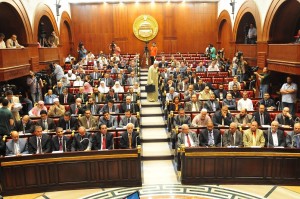GAZA CITY: After sealing a historic unity deal with its rival Fatah, Gaza’s Hamas rulers believe the West can no longer afford to ignore them and must end its policy of ostracism.
The surprise accord, which was signed this week in a bid to end years of bitter rivalry between the two factions, has brought Hamas some much-needed legitimacy, senior Hamas official Ghazi Hamad said in an interview with AFP.
"We have become part of the Palestinian legitimacy," Hamad said, stressing the movement’s willingness to become part of the Palestine Liberation Organisation (PLO), which is headed by Palestinian president Mahmud Abbas, who is also the head of Fatah.
"I think Hamas will open a gate to the international community … in order to engage the world, so that people can understand Hamas more," said Hamad, who is deputy foreign minister in the Gaza government. "This will help us."
For years, Hamas has been blacklisted as a terror organization by the United States and the European Union, who refuse to have anything to do with the Islamist movement.
Hamad argued that continuing such a policy would be futile.
"The policy of disengagement, isolation, boycott or sanctions against Hamas will not build stability for the future," he said.
The reconciliation accord which was signed this week in Cairo was fiercely condemned by Israeli Prime Minister Benjamin Netanyahu, who denounced Abbas’s rapprochement with Hamas as "a great victory for terrorism."
Israel has vowed never to talk to Hamas unless it changes its 1988 charter, which calls for the destruction of the Jewish state.
"The charter is not our Koran. The charter is not the only reference for Hamas," said Hamad, who is considered a moderate within the movement and who pointed to "many changes" since the Islamists won a surprise victory at the ballot box during the 2006 legislative elections.
The international community "should not run away from these changes," he said, pointing out that Hamas had stopped the suicide bombings it was once known for, and had enforced a truce on rocket fire towards southern Israel after a recent flare-up along the border.
Speaking at a ceremony to mark the unity accord in Cairo, Hamas chief Khaled Meshaal spelled out the movement’s goal: "the establishment of an independent sovereign Palestinian state in the West Bank and Gaza Strip, with Jerusalem as its capital" — in other words, a Palestinian state within the 1967 borders.
Although his words stopped short of recognizing Israel, Meshaal’s statement implicitly suggested that Hamas, whose charter calls for the establishment of an Islamic state "from the Jordan River to the Mediterranean Sea," would accommodate the existence of the Jewish state.
Wednesday’s speech was not the first time Meshaal has referred to a state within the 1967 borders, but it was his most public statement on the issue to date.
Meshaal, who lives in exile in Damascus, also said he was ready to give peace talks with Israel another chance, despite the failure of all negotiations since the 1991 Madrid Conference to end the conflict.
"We gave peace a chance since the Madrid Conference 20 years ago and I say that we are ready to agree inside the Palestinian home and with Arab support to give an additional chance, and we will agree on how to manage this chance," he said.
Hamad said the reconciliation accord presented a golden opportunity for change.
"There is now a good opportunity to say: ‘Okay, we can talk to you’," he said. "And regarding the peace process: if our cause is solved peacefully, I’m not against it.
"But we need some positive signals from Israel."



